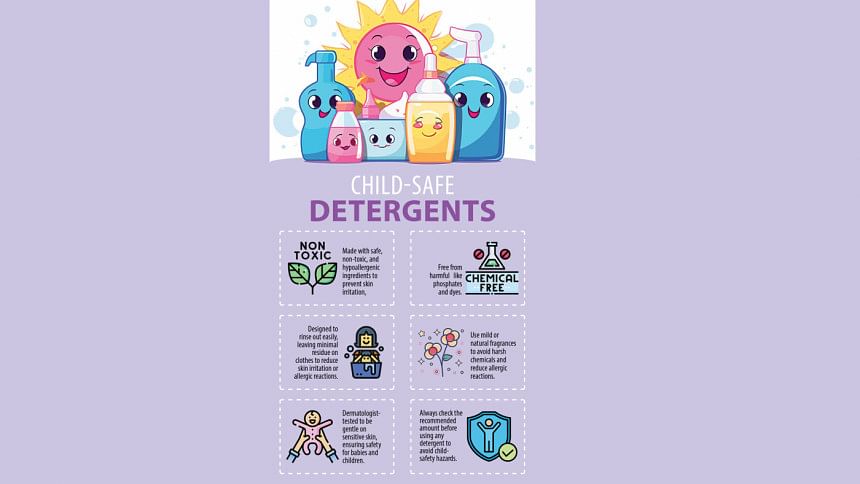Care for babies

Since babies have delicate skin, their clothes should be washed with gentle detergents that minimise chemical exposure. Harsh chemicals, fragrances, and dyes in regular detergents can irritate their sensitive skin, leading to rashes, redness, or even allergic reactions. Specially formulated child-friendly detergents are designed to be gentle and hypoallergenic, offering safer options for babies and young children, whose skin is more susceptible to irritation due to its thinner, more permeable nature.
Skin-related conditions such as eczema, heat rash, hives, and warts are becoming increasingly common among children. The prevalence and types of these issues vary by country, often influenced by social, economic, and environmental factors. In Bangladesh, a notable rise in such conditions is partly due to limited awareness of hypoallergenic or baby-specific products, which are specifically designed to minimise irritation risks.
Conventional detergents may contain chemicals like sulfates, phosphates, and synthetic dyes, which can trigger allergic reactions in children prone to skin sensitivities, leading to symptoms like itching, redness, and swelling. For children with sensitive skin, hypoallergenic detergents with mild formulations are a recommended choice to avoid skin discomfort and flare-ups. These child-friendly detergents are typically dermatologist-tested, formulated to reduce the risk of worsening existing skin conditions.
In addition to skin irritants, strong fragrances in detergents can also contribute to respiratory issues, especially in children with conditions such as asthma. The chemical vapours released from fragranced detergents may aggravate breathing difficulties in sensitive individuals, underscoring the importance of fragrance-free or mildly fragranced detergents for households with young children.
Increasingly, parents are opting for child-friendly detergents to protect their children from exposure to harmful chemicals and allergens. Bangladesh's child-friendly detergent market currently relies heavily on imported brands, such as Babe, Kodomo, and Johnson. Jet Baby Liquid detergent, introduced by the local company Kallol Group in 2018, is the only locally produced option. Other major players, including Unilever, ACI, and Square, are also recognising this concern.
"While there isn't a specific focus on baby clothes or a large-scale hypoallergenic product line, our company's overall product design addresses various consumer needs, including tough stain removal, with consumer safety as a key concern," shares Md. Shadman Sadikin, Marketing Director, Homecare, Unilever Bangladesh Limited.
"ACI does not currently offer products specifically for children, but we are attentive to these issues. Understanding sensitivities and following usage instructions can help minimise health risks, ensuring a safer experience for everyone," remarks Md. Quamrul Hassan, Business Director at ACI Consumer Brands, emphasizing ACI's commitment to using safer chemical formulations.


 For all latest news, follow The Daily Star's Google News channel.
For all latest news, follow The Daily Star's Google News channel. 



Comments